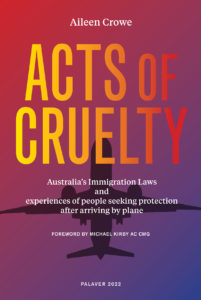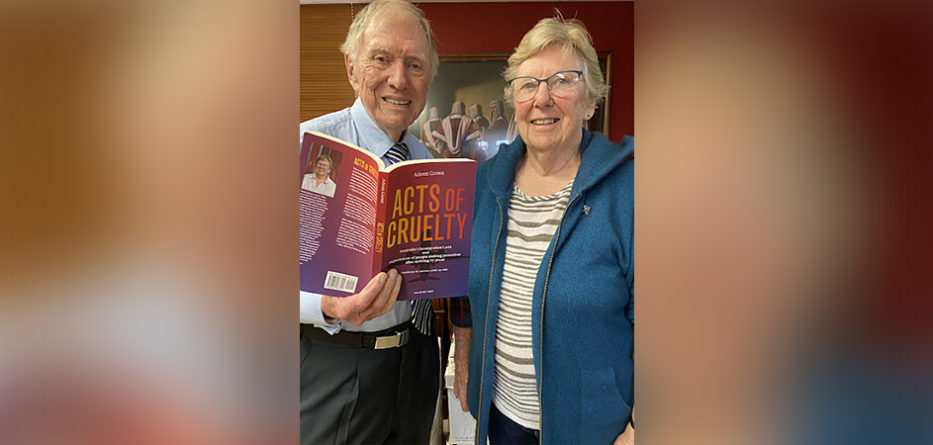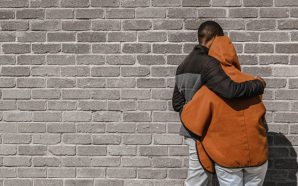While Australians know about people who arrive by boat and Nauru and Manus Island detention centres, the experience of people who apply for refugee status after they have arrived in Australia with visas, and by authorised means is much less widely known about.
Franciscan Missionaries of Mary Sister Aileen Crowe’s remarkable and harrowing book – Acts of Cruelty: Australia’s Immigration Laws and experiences of people seeking protection after arriving by plane – examines the system of immigration laws and policies faced by refugee claimants who arrive in Australia by plane with a valid visa.

The front cover of ‘Acts of Cruelty: Australia’s Immigration Laws and experiences of people seeking protection after arriving by plane’ by Sr Aileen Crowe. Image: Supplied
While it is easy to write in abstract terms about issues like this, about the treatment of vulnerable peoples and communities, this is not what Aileen has done. Instead, she brings the credibility, rigour and humanity fomented by working for decades with people seeking asylum, as a Franciscan nun, advocate, companion and researcher, to bear on this important issue.
Aileen does this in two ways – firstly by staying close to people and to families who are already vulnerable, threatened, and traumatised. By treating them with respect and by telling their stories and describing their trauma, their suffering, their frustration, anger, fears, and sorrow. But Aileen is more than simply a storyteller as, while she is quick to note that she is not a lawyer, she also describes in Acts of Cruelty the various obstacles that the legal system places in the way of people seeking to stay in Australia.
What Acts of Cruelty reveals is a system that is not only highly complex, arcane and labyrinthine, but also contradictory, capricious, inefficient, underfunded and unpredictable.
Indeed, the layers of complexity, and the opportunities for politisation, discrimination, conflict of interest, and random (and no doubt often unintentional) acts of cruelty are almost impossible to explain, let alone justify.
In doing so, Acts of Cruelty makes abundantly clear that the processes that have been created for managing immigration are manifestly inadequate, may leave people in limbo for years, and have created a backlog of applications that runs to 10s of thousands of people.
And here’s the point – these applicants are people. And this is one of the central messages of Acts of Cruelty – Australia’s asylum system is fundamentally dehumanising – it reduces people to objects through its bureaucratic process, and its language of applicants and delegates, processes and systems. People who, as Aileen so wonderfully notes, are not objects without a name, devoid of deep feelings, or without agency, but people like you and me – a neighbour, a person in the checkout queue at the supermarket, the driver at the traffic lights.
This is a deeply disturbing book. And one of profound importance. It describes the personal, social, political and ethical consequences of a system that is breathtakingly inequitable, unjust and inhuman. It also describes how governments of all ideologies, acting in our name, can mine the depths of Australia’s xenophobia and exclusion to advance their own political interests. And in so doing create extraordinary suffering.
But this book is also uplifting because it describes the possibility and impact of compassion and the ways in which one woman can assist people, real people, negotiate the arcane bureaucracy of Australia’s immigration system and find a home.
And finally, this book reminds us that, as is the case with our treatment of First Nations peoples, we cannot look away, we cannot deny the culpability of our governments, but we also cannot ignore our own role in the creation of systemic injustices.
The stories in Acts of Cruelty turn numbers into lives, statistics into people, and laws into a lived experience of freedom or suffering. And this creates solidarity, invites hospitality, and demands justice.
Acts of Cruelty has opened my eyes to the impacts of law and politics and to the power of people to demand and create change. It gives me great pleasure, therefore, to congratulate Aileen on her work – and on this book.
Professor Ian Kerridge is a Professor of Bioethics and Medicine at Sydney Health Ethics (SHE) at the University of Sydney. Professor Kerridge delivered this address at the book launch of Acts of Cruelty: Australia’s Immigration Laws and experiences of people seeking protection after arriving by plane.
To purchase Acts of Cruelty, visit https://www.palaver.com/books#/acts-of-cruelty/








